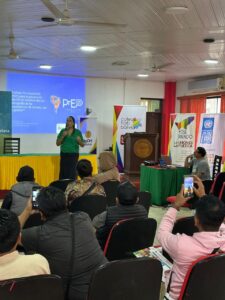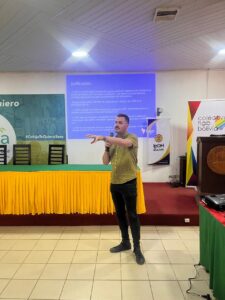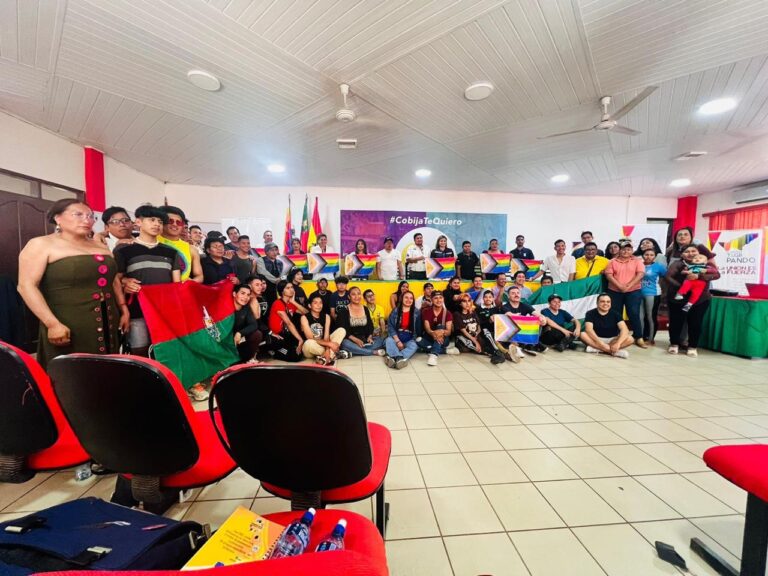
The Regional Coordinator of the PrEP South America Project, Guilherme Passamani, and fellow researcher Marco Aurélio Soares, both from the Federal University of Mato Grosso do Sul (UFMS), made their first trip to the border cities and interior of Bolivia from July 7 to July 14, 2024.
The purpose of the trip was to hold meetings with healthcare professionals in the cities of Corumbá, Puerto Quijarro, and Puerto Suárez, as well as to participate in the 10th Extraordinary Congress of the TLGB Collective in the city of Cobija, to present the project and discuss the implementation process of PrEP in the country.
In an interview, Passamani and Soares shared the challenges they faced, local perceptions of PrEP, and their expectations for the implementation of the prophylaxis in the country. Attendance at the congress was crucial to understand the Bolivian reality and strengthen the necessary alliances for the advancement of the project, which also encompasses the Bolivian cities of Puerto Quijarro and Puerto Suárez.
Interview
I would like to start by asking you to introduce yourselves and tell us a little about your roles in the PrEP South America Project.
Guilherme PassamaniI am Guilherme Passamani, a Professor at UFMS and an Anthropologist. In the project, I serve as the regional coordinator, responsible for the cities of Campo Grande, Corumbá, Ponta Porã, Puerto Quijarro, and Puerto Suárez (Bolivia)
Marco Aurélio Soares: I am Marco Aurélio, a postdoctoral researcher in Infectious and Parasitic Diseases at the Federal University of Mato Grosso do Sul. In the PrEP South America project, I am a field researcher in the municipalities of Campo Grande, Corumbá, and Ponta Porã in Mato Grosso do Sul (Brazil) and at the border with Paraguay and Bolivia.

Did you go to present the PrEP South America Project at a congress? What was the congress? Why did you go?
Guilherme Passamani: We went to present the project at the 10th Extraordinary Congress of the TLGB Collective of Bolivia. It is one of the most important LGBTQIAPN+ collectives in Bolivia, and it was holding its Extraordinary Congress for the year 2024 in the city of Cobija, in the state of Pando. We went because we understand that it is strategic to be close to those who are considering the development of PrEP in Bolivia, which does not yet exist. Some collectives are already in advanced talks for the distribution process of PrEP, which currently only occurs in the private network.
How was your preparation for the presentation?
Guilherme Passamani: Regarding the preparation for the presentation, I believe that the technical visit we made to the border cities of Puerto Quijarro and Puerto Suárez was very important to understand this quite precarious reality concerning PrEP and the complete misinformation. Thus, we went to the Congress with more insights. Generally, everything we presented was very new to most people, except for one institute in Cochabamba, which is further along in the discussion about PrEP. Our preparation was mainly to introduce the project and, to some extent, to ask them to become our partners.
Why was the trip important for the project?
Guilherme Passamani: The trip was very important for the project. First, because it was the country with the most difficulty in contact and about which we knew almost nothing, since PrEP does not yet exist there. It has been under discussion for a few years, but it has not progressed in the Ministry of Health. It seems that now the social movement is the one that is effectively demanding it. In other cities and places, we managed to advance more directly. With Bolivia, starting from this approach, perhaps contact and project development will be easier.
Marco Aurélio Soares: The technical visit was an opportunity to reflect on the field concerning the data to be collected in 2025. Regarding Bolivia, the WHO's pressure for the implementation of PrEP began in 2020, but there is still no forecast for implementation across the territory, only a pilot in Cochabamba, Santa Cruz, and La Paz. Participation was important to present the Brazilian protocol and help in developing the Bolivian protocol.

What preliminary observations about PrEP in the country were possible to extract? What do you plan to do in the next stages?
Guilherme Passamani: The first thing about PrEP is that there is a complete lack of prophylaxis in the country. Discussions are still very preliminary, and I am not sure there is a protocol in the short term, perhaps not even in the medium term, because it clashes with political and moral issues. One can also perceive the importance of the Brazilian SUS, the free nature of SUS, since the Bolivian SUS is paid, and how the Brazilian SUS has served these border regions. That is already an important preliminary result, and it was a question we assumed and concluded is happening. Regarding PrEP in the country, there is nothing, only a discussion, and it is being distributed by some private institutions at high prices, making access difficult for most people. It is a deeply different context from Brazil.

Talking about local perceptions, how do you evaluate the acceptance and knowledge about PrEP in Bolivia compared to other South American countries?
Guilherme Passamani: Knowledge about PrEP is almost nonexistent, very restricted. Even leaders of the social movement knew very little; it was one or two people from the institution, and even the doctor from the Ministry of Health, who works with HIV and other infections, knew very little about PrEP. It is a context of significant information scarcity, and an approach is necessary, considering the know-how already developed in Brazil, especially in our State Data Bank project. I believe it is essential to share this with this neighboring country, which is still at a much earlier stage concerning this prophylaxis.
Marco Aurélio Soares: It was a very effective participation, with future alliances that will help the project in the three provinces where PrEP will be initiated.
What was the reaction of the local and international organizations present at the congress regarding the PrEP South America Project?
Guilherme Passamani: The reaction of the local organizations present at the congress concerning PrEP was one of great interest in what we were saying, with very basic questions and, apparently, a significant acceptance of our project. We will see if this materializes, but there was much acceptance, and people showed a lot of interest, questioning quite a bit due to the many taboos and doubts regarding PrEP. We tried to clarify all that as much as possible.
Marco Aurélio Soares: They were surprised to learn that Bolivia is isolated in the dispensing of the medication, being the only country in South America that does not provide PrEP. We had the opportunity to understand the reality of the Bolivian Unified Health System.
By: Mayllon Oliveira
Review: Kris H. Oliveira



















